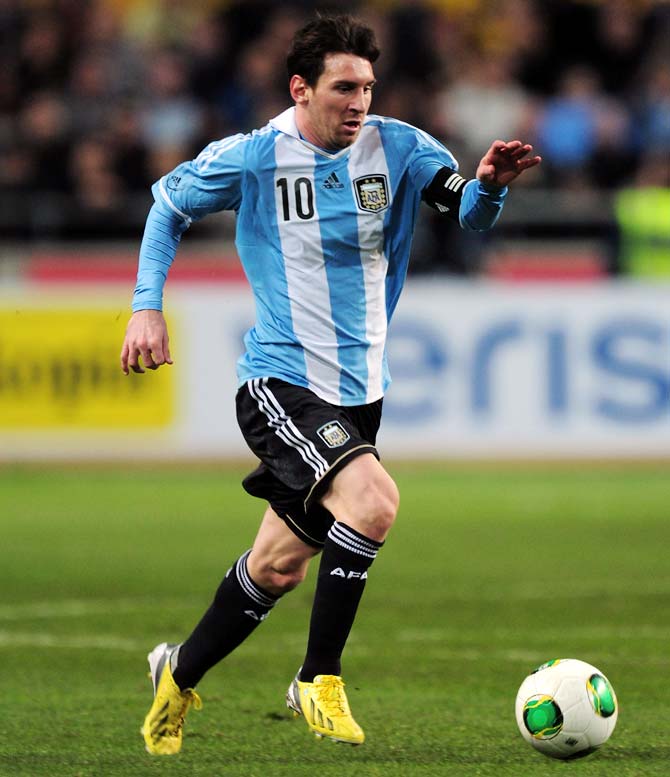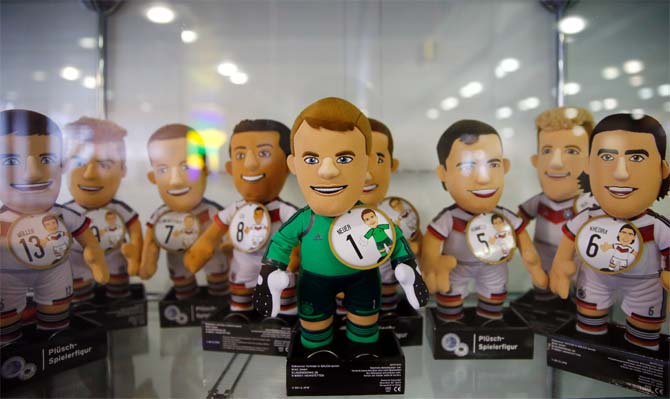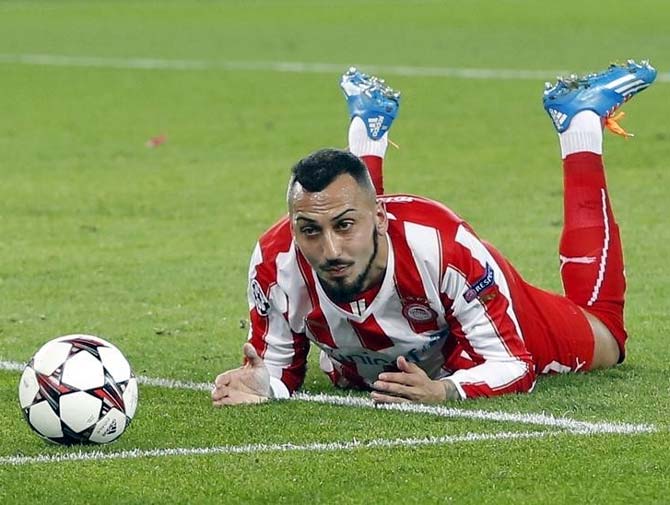Photographs: Jamie McDonald/Getty Images
Lionel Messi would trade all his Barcelona success for a World Cup winners' medal with Argentina to sit alongside the game's greats, according to compatriot Ossie Ardiles.
"That is how important the World Cup is for him," said Ardiles, who was in the Argentina team that won the 1978 World Cup at home in Buenos Aires.
Ardiles, speaking to delegates at the Soccerex Asian Forum held by the banks of the Dead Sea, said that while Messi might be regarded by some as the best player the world has seen, a World Cup win is vital for his legacy.
Messi, 26, has claimed 21 club prizes with Barca and has also won the World Youth Cup in 2005 and 2008 Olympics with Argentina. Next month's World Cup will be his third after being used sparingly as a substitute in 2006 and playing in 2010.
"Right now Messi might be regarded as the greatest player in the whole history of the game but he would give all the medals he has won with Barcelona just to win one World Cup, that is how important it is for him," said former midfielder Ardiles.
"To be considered alongside the top, top guys like Pele and Diego Maradona and so on, he not only needs to be in the World Cup but to win it."
HOME ADVANTAGE
Ardiles also said that he regarded Argentina as favourites to win the tournament in neighbouring Brazil, but joked he could not say anything else if he wants to remain popular back home.
On a more serious note he said that while Brazil clearly has a very good chance, home advantage is a lot less important than it once was.
"It is a fact that no European teams have won the World Cup in South America but after saying that it doesn't mean it is going to stay like that forever.
"Three or four teams from Europe have a big chance in Brazil, but though Brazil are playing at home, being at home is not a big advantage anymore. Players play all over, things have changed. It is a lot less than it used to be.
"At the beginning of the tournament it can be an advantage but if things don't go well for a young team like Brazil's it can be like a boomerang effect. The pressure grows and grows and comes back and can hit you hard. There is so much pressure, it is tremendous."
PURE JOY
Ardiles played at the 1978 and 1982 World Cups and gave a fascinating insight into how he felt about the experience.
"I did not enjoy playing in the World Cup. You are always worried about how you are going to perform, the other team, I did not enjoy it.
"But, of course, when the final whistle went in 1978 and we were champions, you feel happiness, ecstasy, pure joy, and its beautiful and a unique moment in your life - and that feeling lasted for a long time.
"I enjoyed it after the World Cup but not while I was playing in it."
Asked if wives and girlfriends were around the Argentine camp when they won in 1978, Ardiles replied: "It's a very bad idea having wives and girlfriends around.
"Some players want to have the wife and the girlfriend next door. It's a bad idea. In 1978 we didn't see our wives for months, but we survived and won. In 1982 we had the wives and we were terrible."
Fancied Germany are World Cup outsiders in home poll
Image: Puppets of Germany's national soccer team players on display at the headquarters of the German national soccer association in Frankfurt.Photographs: Kai Pfaffenbach/Reuters
Despite being considered one of the title favourites at next month's World Cup, only about one in 20 Germans believe the side can lift the trophy, according to poll published in Stern magazine on Wednesday.
The poll of a representative sample of 1,002 people revealed only six percent thought coach Joachim Loew's team can end an 18-year trophy drought at the tournament in Brazil.
About one in 10 believe Germany will reach the final while 41 percent think the journey will end at the semi-final stage. About one in four think they will go out in the quarter-finals.
The Germans, whose last trophy win was at Euro 96, are drawn in Group G with Ghana, Portugal and the United States with almost all of those polled certain they will advance to the knockout phase.
Only two percent said they will not make it out of the group.
Home fans are not convinced the team can challenge for the World Cup with only two strikers - 35-year-old World Cup stalwart Miroslav Klose and the untested Kevin Volland.
There are also doubts over the stability of the central defence with a perception that the talented squad lacks natural leaders capable of shouldering expectations of a success-starved population.
The poll was conducted on May 8 and 9 by the Forsa Institute on behalf of the magazine and after the announcement of the 30-man provisional squad.
Loew will reduce it to 25 or 26 later on Wednesday before submitting his final 23-member squad by June 2.
The Greek World Cup secret's out - Mitroglou is in
Image: Kostas MitroglouPhotographs: Gonzalo Fuentes/Reuters
Fulham striker Kostas Mitroglou, who has barely played this year due to a knee injury, was included in a 30-man provisional World Cup squad reluctantly revealed by coach Fernando Santos on Wednesday.
Santos had previously stated that he would not announce his provisional squad, only his final selection of 23 players, on May 19,
However, following the circulation of an inaccurate squad list on various international media websites, the Portuguese coach opted to end the speculation.
Mitroglou, who joined the London club from Olympiakos Piraeus for 11 million pounds ($18.52 million)in January, played for only two hours in three matches as the club were relegated.
However, his three goals in the 4-2 aggregate playoff victory over Romania that took Greece to the finals have obviously kept him in favour.
The 26-year-old’s team-mate Giorgos Karagounis, the Greece captain with 132 caps but who played only 14 times for Fulham this season, was also named in the squad, along with other experienced campaigners such as midfielder Kostas Katsouranis and Georgios Samaras, who is leaving Celtic this summer.
Contrary to the inaccurate squad released by some news sites, goalkeeper Michalis Sifakis (Atromitos), defender Dimitris Siovas (Olympiakos) and midfielder Sotiris Ninis (PAOK) havenot made the provisional squad, while there are places for defenders Nikos Karabelas (Levante) and Vangelis Moras (Hellas Verona), midfielder Nikos Karelis (Panathinaikos) and strikers Stefanos Athanasiadis (PAOK) and DimitrisPapadopoulos (Atromitos).
Greece Greece face Colombia, Ivory Coast and Japan in Group C in Brazil.
Greece squad:
Goalkeepers: Orestis Karnezis(Granada), Panaglotis Glykos (PAOK), Stefanos Kapino (Panathinaikos), Alexandros Tzorvas (Apollon Smyrnis).
Defenders: Avraam Papadopoulos, Kostas Manolas, Giannis Maniatis, Jose Holebas (all Olympiakos), Sokratis Papastathopoulos (Borussia Dortmund), Giorgios Tzavellas (PAOK), Loukas Vyntra (Levante), Vasilis Torosidis (Roma), Nikos Karabelas (Levante), Vangelis Moras (Hellas Verona).
Midfielders: Alexandros Tziolis (Kayserispor), Andreas Samaris (Olympiakos), Kostas Katsouranis (PAOK), GiorgosKaragounis (Fulham), Panagiotis Tachtsidis (Torino), Ioannis Fetfatzidis (Genoa), Kostas Fortounis (Kaiserslautern), Lazaros Christodoulopoulos (Bologna) Panagiotis Kone (Bologna), Nikos Karelis (Panathinaikos).
Forwards: Dimitris Salpingidis (PAOK), Giorgios Samaras (Celtic), Konstantinos Mitroglou (Fulham), TheofanisGekas (Konyaspor), Stefanos Athanasiadis (PAOK), Dimitris Papadopoulos Atromitos)




Comment
article